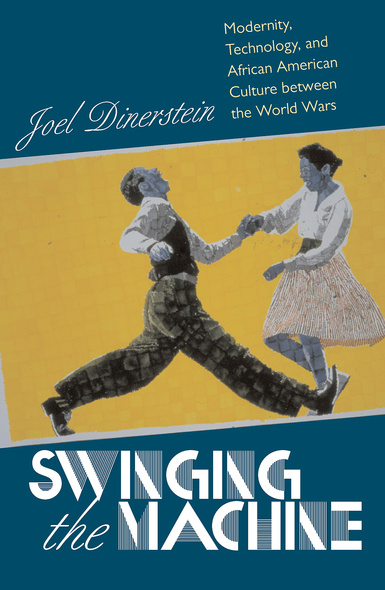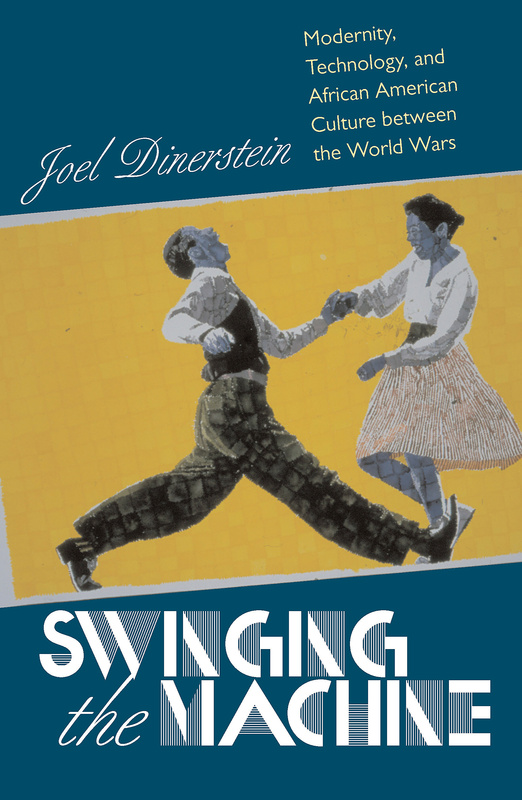Swinging the Machine
Modernity, Technology, and African American Culture between the World Wars
University of Massachusetts Press
In any age and any given society, cultural practices reflect the material circumstances of people's everyday lives. According to Joel Dinerstein, it was no different in America between the two World Wars-an era sometimes known as the "machine age"-when innovative forms of music and dance helped a newly urbanized population cope with the increased mechanization of modern life. Grand spectacles such as the Ziegfeld Follies and the movies of Busby Berkeley captured the American ethos of mass production, with chorus girls as the cogs of these fast, flowing pleasure vehicles.
Yet it was African American culture, Dinerstein argues, that ultimately provided the means of aesthetic adaptation to the accelerated tempo of modernity. Drawing on a legacy of engagement with and resistance to technological change, with deep roots in West African dance and music, black artists developed new cultural forms that sought to humanize machines. In "The Ballad of John Henry," the epic toast "Shine," and countless blues songs, African Americans first addressed the challenge of industrialization. Jazz musicians drew on the symbol of the train within this tradition to create a set of train-derived aural motifs and rhythms, harnessing mechanical power to cultural forms. Tap dance and the lindy hop brought machine aesthetics to the human body, while the new rhythm section of big band swing mimicked the industrial soundscape of northern cities. In Dinerstein's view, the capacity of these artistic innovations to replicate the inherent qualities of the machine-speed, power, repetition, flow, precision-helps explain both their enormous popularity and social function in American life.
Yet it was African American culture, Dinerstein argues, that ultimately provided the means of aesthetic adaptation to the accelerated tempo of modernity. Drawing on a legacy of engagement with and resistance to technological change, with deep roots in West African dance and music, black artists developed new cultural forms that sought to humanize machines. In "The Ballad of John Henry," the epic toast "Shine," and countless blues songs, African Americans first addressed the challenge of industrialization. Jazz musicians drew on the symbol of the train within this tradition to create a set of train-derived aural motifs and rhythms, harnessing mechanical power to cultural forms. Tap dance and the lindy hop brought machine aesthetics to the human body, while the new rhythm section of big band swing mimicked the industrial soundscape of northern cities. In Dinerstein's view, the capacity of these artistic innovations to replicate the inherent qualities of the machine-speed, power, repetition, flow, precision-helps explain both their enormous popularity and social function in American life.
The strength of this book is its truly interdisciplinary quality. The breadth of detail, the facility of its application and expression, the suppleness and tact of the argument are all exemplary. It will be useful to everyone interested in racial interaction in the U.S. and it will be on reading lists for courses on U.S. modern culture as well as jazz history.'—W. T. Lhamon, Jr., author of Raising Cain: Blackface
Performance from Jim Crow to Hip Hop
'More than any other study I've read, Dinerstein's book gets to the heart of why the 1930s and 1940s have been designated as the Swing Era. Yet the author traces concern over 'the tempo of life' well back into the nineteenth century through the writings of Whitman and Melville and mythic figures like John Henry. The depth and breadth of research is impressive and the writing is superb. I don't recall a word of jargon-an unusual distinction for cutting-edge work in cultural studies.'—David W. Stowe, author of Swing Changes:
Big Band Jazz in New Deal America
'Damn, I love this book! Dinerstein writes about the interplay between aesthetic principles and social conditions with as much insight and grace as anyone ever has. Rattling machines and musical rhythms, chorus lines and assembly lines, industrial landscapes and racialized bodyscapes, mechanical motion and the flow or chug of dancing bodies—Dinerstein brings these together in original, compelling, and always illuminating ways. Swinging the Machine remaps the social and political meanings of swing, the fully national resonance of African American cultural forms, modernity and anti-modernism, and a good deal else besides. A brilliant and beautiful book.'—Matthew Frye Jacobson, author of Whiteness of a Different
Color: European Immigrants and the Alchemy of Race
'In one elegantly written, well-researched, and delicately argued project, Dinerstein has produced a magnificent interdisciplinary cultural history that is a must-read for both graduate students and advanced undergrads in a variety of related fields, including U.S. cultural history, African American history and culture, history of technology, and the history of both popular music and dance.'—American Quarterly
Joel Dinerstein is Assistant Professor of English and American Studies at Tulane University.





